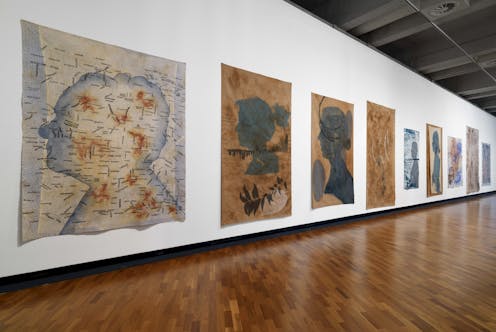How artists Judy Watson and Helen Johnson are stripping back Australia's 'white blanket of forgetfulness'
- Written by Julie Shiels, Senior Industry Fellow, RMIT University

In his 1980 Boyer Lecture, art historian Bernard Smith said a “white blanket of forgetfulness” had been thrown over the horrors of Australia’s colonial past.
Renowned Australian artists, Waanyi woman Judy Watson and second-generation Anglo immigrant Helen Johnson, have individually spent decades exposing these secrets by translating archival material into paintings, prints and installations.
In a new exhibition, the red thread of history, loose ends, they come together in a visual, and conceptual dialogue of reworked maps, cartoons, proclamations, records and correspondence.
Watson takes charge of the shocking historical material she exposes. No anger or outrage is evident, even though her emotionally charged paintings and installations deal with deaths in custody, genocide or indentured labour.
Instead, she overwrites these crimes and injustices by initiating communal artmaking processes with friends and family or layering them with indigenous plant life and motifs from her country.
By contrast, there is an urgency to Johnson’s work. The shocking words in the texts she exposes spill out unedited across large canvases.
Multiple layers are built up with complex textures of raked paint, masking and interpretations of images sourced from archives. The surfaces are then cut and pealed back to reveal hidden and intersecting content: Australians uncovering the true history of colonisation.
The banality of evil
Watson exposes the banality of the bureaucratic and institutional language of colonial records.
In Carpentaria, we hear the words of white men from stations located on Watson’s country, who petitioned the “protector” complaining about mandated wages for Aboriginal workers. They wanted to pay them less.
Watson translated their signatures onto canvas and stained it by dancing pigment and volcanic soil into its fibres with her community.
The work is then overlaid with motifs from her country, symbolically referencing her great, great grandmother Rosie’s escape from a massacre.
Watson similarly reasserts her connection to country. With In broken Country, blacks not to be trusted, she has highlighted words on an 1897 ethnographic map, then overpainted with an image of Gotton tree fibre string suggesting cultural tracks and trading routes.
Shocking words, shocking histories
A quiet fury sits under Johnson’s layered reinterpretations of the establishment of structures that justified the primacy of white men with racist policies and attitudes.
There is a deliberate brutality in Crises, Johnson’s response to the stories and attitudes reported in the colonial publications The Bulletin and The Police Gazette.
Reworking their decorative lettering, she captures a colony obsessed with wealth, fixated on class and preoccupied with law and order. “Complacent”, “cowed”, “ignorant” and “complicit” reflect the crude characteristics of Australian colonial society.
The calligraphy has been updated to include images of contemporary figures such as Scott Morrison and George Pell, alluding to the continuities of Australian history.
Johnson challenges the pomp and glory of federation and the establishment of the first federal parliament to remind us it formalised an ethos of racism and discrimination still felt today.
Sitting below reconfigured press images of the time, she introduces a frieze of cartoon-like heads and speech bubbles quoting Hansard records from the first sitting.
Most revealing is Samuel Winter Cooke’s comment:
We must do our best to see that Australia remains as a possession for the white man, and the white man only.
Women’s perspective
Watson’s interest in matrilineal kinship is realised in a series of paintings using silhouettes of her mother, her sister, her daughter and herself.
She layers topographical maps, flora and other symbols from their country under and over their portraits. Global temperature charts gestures ominously toward the future.
In her chilling video work, Skullduggery (2021), Watson also exposes the callous disregard of “bone enthusiasts” like Agnes Kerr, matron of Burketown Hospital in 1938.
Voiced by Aboriginal readers, Kerr’s letters to London’s Wellcome Museum catalogue the bones of known Aboriginal people she has plundered from burial sites.
Johnson places a birthing woman at the centre of The Birth of an Institution. Surrounded by onlookers including bankers, priests and politicians, the dome of an ornate colonial structure is crowning.
The scale of the building is monstrous. Unlike the waiting stakeholders, the identity of the mother is obscured – she will not be acknowledged for her labour.
Truth telling
Addressing colonisation and its legacies is an undertaking white artists often avoid. Many believe it should only be told by First Peoples.
Johnson, however, believes processing the constructs of colonisation is also the work of people who benefit from it.
It was Johnson’s initiative to work with Watson and the ensuing dialogue has produced a complex and nuanced retelling of history.
Their works harness the words of the colonisers to poetically expose blind spots and provide evidence of colonial crimes and cruelties. Once seen, they can never be forgotten.
Judy Watson & Helen Johnson: the red thread of history, loose ends is at Monash University Museum of Art (MUMA) until November 12, and will be at Museum of Art and Culture, yapang, NSW from May 2023.
Read more: Male artists dominate galleries. Our research explored if it’s because ‘women don’t paint very well’ – or just discrimination[1]

















